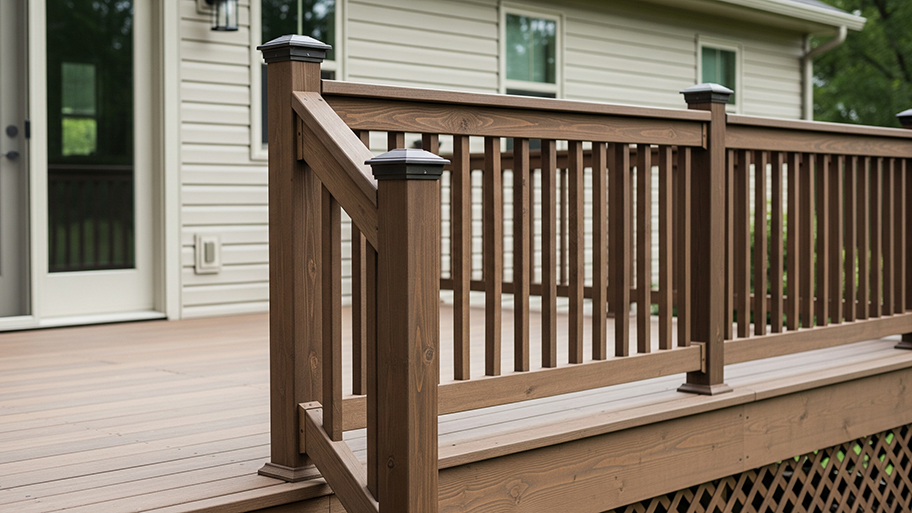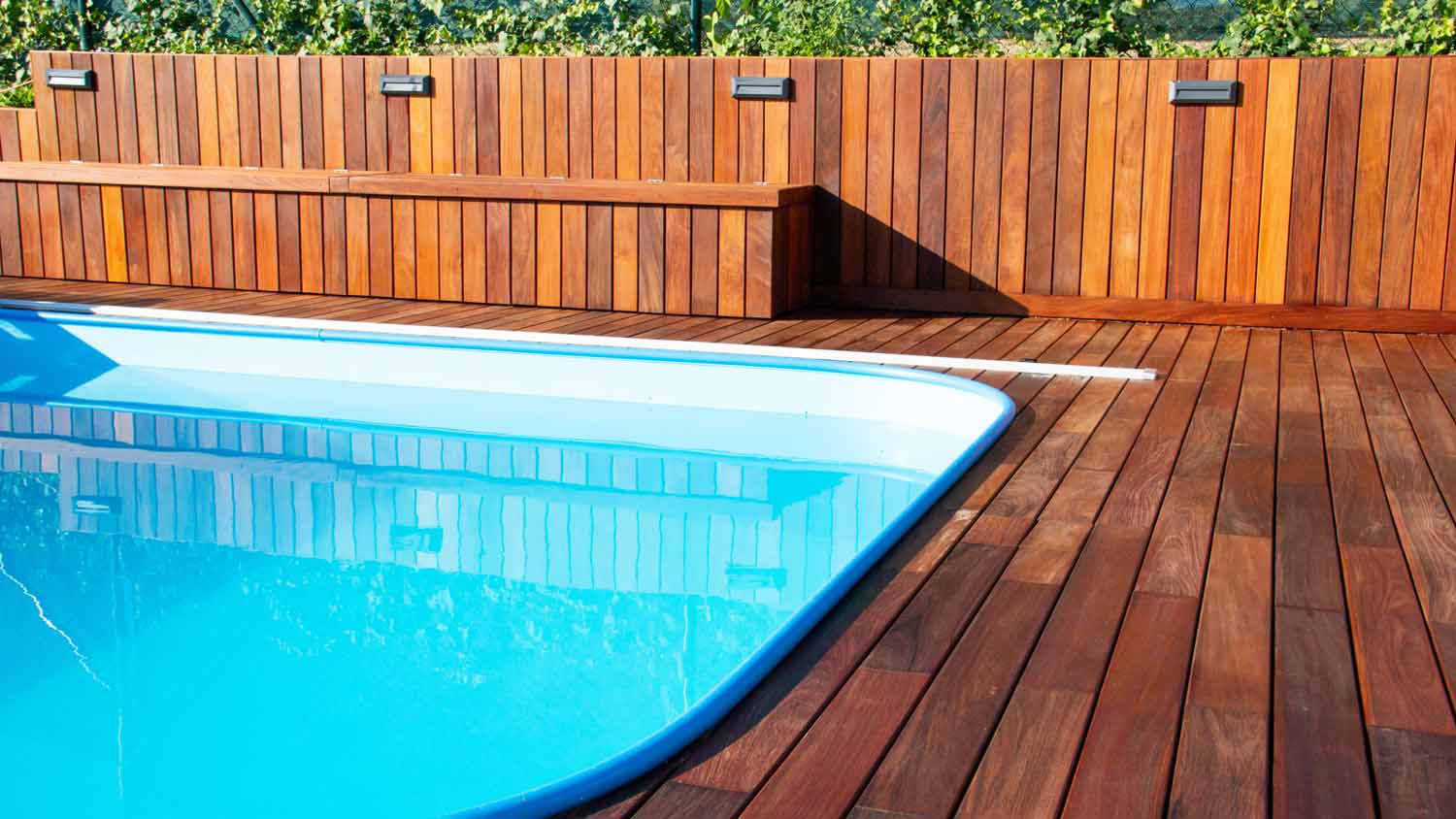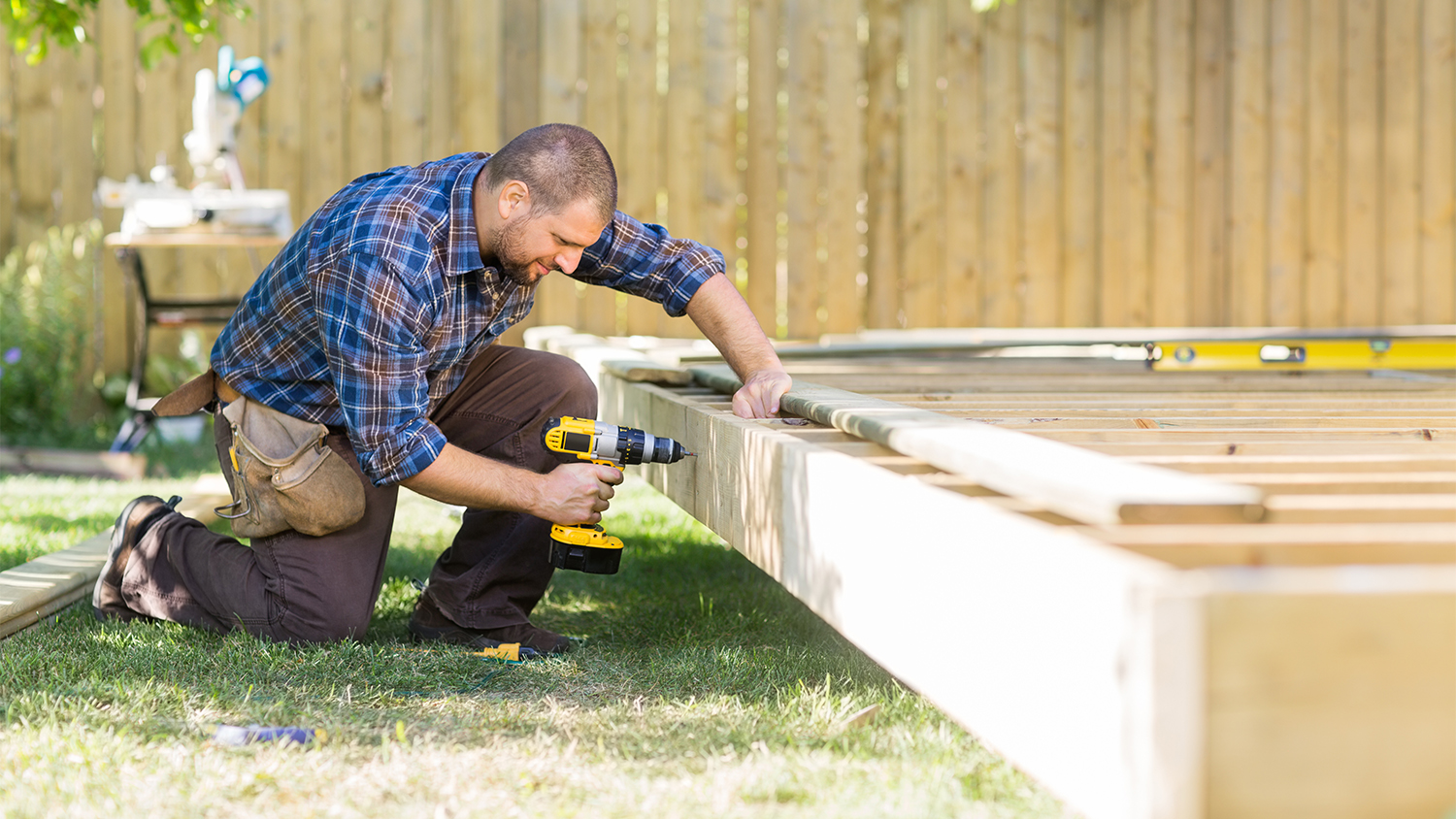
The average cost of a deck railing depends on size, type, material, and labor in your area. Check out this guide to determine what works for your budget.
The cost of an aboveground pool deck is $5,000 on average, but you might pay anywhere from $300 to $20,000, depending on the size of the pool and deck and where you live.


Factors affecting pool deck cost include size, materials, location, and whether the pool is in-ground or aboveground.
Pool deck costs vary significantly by material, with higher-end materials (such as stone or certain woods) costing $30-$40 per square foot.
For a mid-sized pool, you can expect to spend between $3,000 and $8,000 on materials.
Labor makes up 50 to 70% of the total cost of a deck.
Building an aboveground pool deck can cost between $300 and $20,000, depending on its size and the materials used. That said, the majority of homeowners spend between $3,000 and $12,000, with an average cost of $5,000. This outdoor amenity enhances both accessibility and aesthetics in your backyard, offering a stylish way to sit poolside.
To help homeowners with their next project, Angi provides readers with the most accurate cost data and upholds strict editorial standards. We’ve surveyed thousands of real Angi customers about their project costs to develop the pricing data you see, so you can make the best decisions for you and your home. We pair this data with research from reputable sources, including the U.S. Bureau of Labor Statistics, academic journals, market studies, and interviews with industry experts—all to ensure our prices reflect real-world projects.
The size of your deck is a significant cost factor, as larger decks tend to be more expensive, sometimes increasing the total cost by more than 100%. Here’s what you can expect to pay for materials based on deck and pool size:
| Pool Size | Deck Square Footage | Cost Range |
|---|---|---|
| Small | 300–600 | $1,000–$5,000 |
| Medium | 600–900 | $3,000–$8,000 |
| Large | Over 900 | $7,000–$12,000 |
Pool deck material costs vary significantly, with affordable options like plastic and artificial turf starting at $2 per square foot. On the other hand, higher-end materials (like stone or certain woods) can cost $30 to $40 per square foot. There are also many options in between.
Here are some estimated costs for aboveground and in-ground pool decks based on material:
| Material | Type | Average Material Cost per Square Foot |
|---|---|---|
| Artificial turf | Above-Ground / In-Ground | $2–$8 |
| Plastic | Above-Ground / In-Ground | $2–$12 |
| Natural wood | Above-Ground / In-Ground | $3–$25 |
| Poured concrete | Above-Ground / In-Ground | $4–$8 |
| Composite | Above-Ground / In-Ground | $4–$12 |
| Precast concrete | Above-Ground / In-Ground | $5–$12 |
| Pressure-treated wood | Above-Ground / In-Ground | $5–$30 |
| Pavers | In-Ground | $6–$8 |
| Brick | In-Ground | $8–$12 |
| Rubber | In-Ground | $9–$20 |
| Stone | In-Ground | $10–$40 |
| Aluminum | Above-Ground / In-Ground | $12–$15 |
| Tile | In-Ground | $15–$20 |
| Stamped concrete | Above-Ground / In-Ground | $15–$30 |
| Coral stone | In-Ground | $15–$40 |
Many other factors influence the cost of your pool deck, including permits, hardscaping, labor rates, and more. Here’s what to expect.
Labor: $15–$35 per square foot
Pool coping: $30–$50 per linear foot
Above-ground vs. in-ground: 50%–100% higher price for in-ground pool decking than aboveground decking, due to increased materials, labor, and site preparation
Hardscaping: $1,000–$3,000
Permits: $450–$2,400
Staircase: $15–$25 per square foot
Outdoor lighting fixtures: $90–$150 per piece
Retractable deck awning: $2,000–$3,500
Pool lift: $2,000–$9,000, plus installation costs
Labor costs to build a deck account for up to 65% of the total project cost, so a DIY approach can offer substantial savings. For example, if a professionally built composite deck costs $10,000, you might save around 35%—or $3,500—by building it yourself, excluding the price of tools.
That said, hiring a local deck builder has many benefits, including the following:
Pros can recommend the best pool deck size, shape, and material for your project.
Many professional builders offer warranties.
Projects are often completed faster and with greater efficiency.
Pros are familiar with local building codes, permit requirements, and safety standards.
They handle essential site prep, including grading, excavation, and installing specialized concrete footings.
You might attempt a DIY pool deck in the following situations:
Your foundation is stable.
You have access to the necessary tools, including hand saws, circular saws, power drills, and straightening tools.
The deck design is simple and doesn’t require complex framing or multi-level structures.
You’re using beginner-friendly materials, such as pressure-treated pine or modular decking systems.
You’re familiar with your local building codes and permit requirements.
To save money on pool deck installation, consider the following tips:
Choose more affordable materials, such as artificial turf (starting around $2 per square foot) or basic plastic decking.
Schedule your project during the off-season when contractors may offer discounts of 5% to 15% due to lower demand.
Opt for a smaller deck if possible. For example, reducing the deck size by 100 square feet might save $1,000 to $4,000, depending on material and labor costs.
Select a basic rectangular layout to reduce framing and labor costs by 20% to 40%.
Limit extras like built-in lighting, railings, seating, or awnings, which can add $1,000 to $5,000 or more to your total cost.
Handle some tasks yourself. Removing old decking or clearing the site can save you $500 to $2,000 in labor fees, for example.
Comparing at least three different contractor bids can save you 10 to 25% by helping you find the best option.
DIY pool deck construction saves 35% on average, but it’s a difficult project without experience.
Hiring a deck builder ensures your project is completed quickly and efficiently, with adherence to local codes and safety standards.
Remember to factor in add-ons like pool staircases, lighting fixtures, and patio furniture.
You can save money by choosing budget-friendly materials, opting for a smaller deck, or booking contractors during the off-season.
From average costs to expert advice, get all the answers you need to get your job done.

The average cost of a deck railing depends on size, type, material, and labor in your area. Check out this guide to determine what works for your budget.
Deck replacement costs depend on materials, any structural damage you need to fix, and more. This guide explores how much it costs to replace or repair a deck.

Old and run-down porch railings can be an eyesore and pose a risk of falling. Find out how much it costs to replace your worn out porch railings with new materials.

Deck board replacement can keep your outdoor space looking good and safe to use. Learn how to replace deck boards yourself.

A worn-out pool deck is more than just unsightly. Learn the signs your pool deck needs to be resurfaced so you can address the issue ASAP.

Discover floating deck cost estimates, including average prices, installation factors, and ways to save. Learn what impacts your floating deck cost.